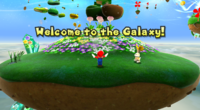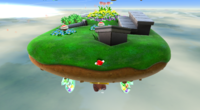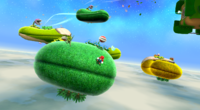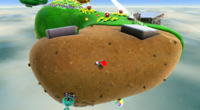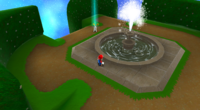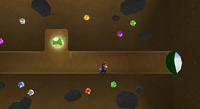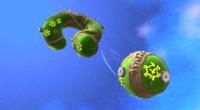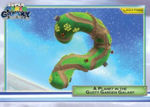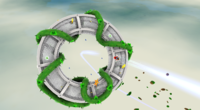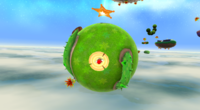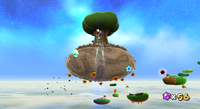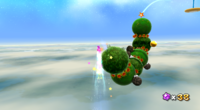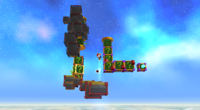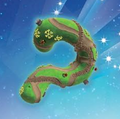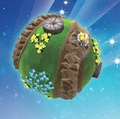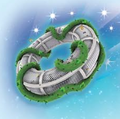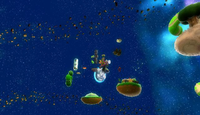Gusty Garden Galaxy
- Not to be confused with Gusty Galaxy.
- This article is about the galaxy in Super Mario Galaxy. For the musical composition of the same name, see Gusty Garden Galaxy (theme).
| Gusty Garden Galaxy | |
|---|---|
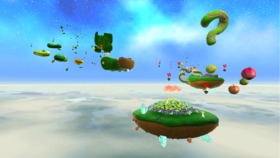 Screenshot of Gusty Garden Galaxy during "Bunnies in the Wind". | |
| Area | Bedroom |
| How to unlock | Get 24 stars and complete Bowser Jr.'s Airship Armada. |
| Boss(es) | Major Burrows |
| Comet(s) | Daredevil Comet Purple Comet |
| Mission(s) | Bunnies in the Wind The Dirty Tricks of Major Burrows Gusty Garden's Gravity Scramble Major Burrows's Daredevil Run Purple Coins on the Puzzle Cube The Golden Chomp |
| Stars | |
| Galaxy icon | The Puzzle Cube, the Question Mark Planets, and the Apple Planets |
- “Think you can catch me, boiyoing?”
- —Star Bunny, Super Mario Galaxy
The Gusty Garden Galaxy is a galaxy from the game Super Mario Galaxy that is located in the Bedroom. It features many grass and plant themed planetoids scattered throughout the galaxy. Many of them can only be reached by grabbing onto a Floaty Fluff and spinning to glide on gusts of wind from one planet to the next. The sky in the Gusty Garden Galaxy is perpetually swirling with a light gray foggy hue. The boss of this galaxy is a mole named Major Burrows.
Planets/Areas
NOTE: Unless otherwise noted, all names are unofficial.
Starting Planet
This is a relatively small planet with two sides. On the top of the planet, there's nothing more than some flowers, a few Crystals, two Star Bunnies, and some Floaty Fluff. On the bottom of the planet, which is completely covered in dirt, there are only some Goombas that appear when Ground Pounding stumps (or Tracks during later missions), rocks and prickly plants. This is the first planet that Mario lands on in every mission except the Prankster Comet missions. A powerful gust of wind spirals from this planet to the next planet.
Stone Pieces Planet
This planet looks a little like the Starting Planet, though it features several pieces of stone architecture embedded in the ground, including a stone pillar, stone steps, and a stone pedestal. The top of the planet has flowers and more Floaty Fluff. It also has a Warp Pipe on the underside that leads to the inside of the planet, as well as a ? Coin that makes several rings of Star Bits appear between this planet and the next. Mario can collect these with the Star Pointer when standing on the planet or use a Floaty Fluff and ride on the wind in order to get closer to them (or fly through them). Later in the game, the inside of the planet will be filled with many prickly plants and another ? Coin, which will make a Rainbow Star appear. A single Piranha Plant also awaits on the top of the planet, and will yield a coin when defeated.
Bean Planets
There are several oddly shaped planetoids in the Gusty Garden Galaxy that look a lot like beans. These planets are pretty small and slightly resemble a few of the planets from the Good Egg Galaxy. They each have relatively different sizes but basically the same form overall. Most of them are inhabited only by Piranha Plants, Montys, and Flipbugs. They are so small and closely positioned together that Mario is able to travel between them using nothing other than Sproutle Vines. On many of the planets, Sproutle Vines will already be out in the open. In that case, all Mario has to do is spin to make it appear. However, more often than not, he will have to defeat at least one Piranha Plant in order to make a Sproutle Vine appear. On the final Bean Planet, a Spiny Piranha Plant awaits. After it is defeated, the Launch Star to the next planet will appear. There is also a hidden path among these planets, which is accessed by means of a Sproutle Vine on the underside of one of the planets. It will allow Mario to circumvent one of the planets that have a Spiny Piranha Plant on it, but will ultimately lead him back to the same planet that he would have ended up on regardless. but the Octoguys in Bean Planets, are enemies.
Curve Planet
This relatively simple planet is shaped like a curve twisting to the left. On the top of the planet are flowers, another stone pedestal, and of course, more Floaty Fluff, which Mario must use to get to the next planet. Unlike most planets, the underside of this planet is partly covered in grass in addition to the top side. There are not many enemies or obstacles here, only a few Piranha Plants, Flipbugs, and the occasional Monty. A hidden Sproutle Vine on this planet will reward Mario with a 1-Up Mushroom if he follows it to the end.
Puzzle Cube
As its name implies, this planet is shaped like a gigantic cube. The "puzzle" part comes into play as a result of the many hedges that are present on this planet, many of which have been trimmed in such a way that they form a maze in some areas of the planet. There are different obstacles on each side of the Puzzle Cube, and a fountain on the side that Mario lands on when he touches down here. There is also a small cylindrical underground tunnel running straight through the center of the planet which holds a few prizes, including Star Bits and a 1-Up Mushroom. When Mario first lands here, he must successfully chase and catch a playful Star Bunny to get the Power Star. He later returns here when a Purple Comet is in orbit, where he must collect at least 100 Purple Coins within a certain time limit in order to get the Power Star.
Question Mark Planets
These two planets are collectively referred to as the Question Mark Planets, as they clearly resemble their titular punctuation mark. In the second level in the Gusty Garden Galaxy, Mario uses a Floaty Fluff to glide to the bottom planet first, and then uses a Sling Star to reach the top planet. The first planet contains only some flowers and an Undergrunt, which Mario must defeat to progress. This planet acts as the "dot" of the question mark, while the second planet is much bigger and consists of the main body of the question mark. The top planet is infested with three Undergrunts which Mario has to defeat to make the Launch Star to the next planet appear.
Super Mario Galaxy trading card description
Landing here from the previous grassy planet turned dirtpath central, Mario finds more of the same on this question-mark-shaped planetoid. Mario must rid the planet of three moles by ground-pounding the dirt to bring them to the surface and then Star-Spinning them out into the cosmos.
Hedge Ring Planet
This planet is optional, and is fairly easy to miss if the player is not careful. Normally, the Launch Star from the previous planet will just shoot Mario straight through this planet to the next planet. Therefore, Mario can only visit this planet if he quickly activates one of the five Pull Stars positioned around the inner ring of the planet. After he is pulled to the planet, he will find many ? Coins which will make multiple Star Bits appear around the planet. However, he must be cautious when attempting to collect them, as the planet is surrounded by large spiky vines, forcing Mario to follow a designated path around various parts of the planet. When he reaches the "end" of the planet, another Launch Star will take him to the next planet.
Apple Planets
These planets consist of nothing more than three huge apples that get increasingly larger as Mario progresses. The end two apples are red and the apple in the middle is green. On the planets are multiple wooden pegs which can be Ground Pounded to release anything from Star Bits to Flipbugs. These planets are also inhabited by many creatures, including several Wigglers, Flipbugs, and, in the case of the final planet, a few boulders. When Mario lands here, he must Ground Pound the correct stumps on each Apple Planet in order to make a Big Green Caterpillar burrow through each of the three planets. Mario can then use the caterpillar's body as a bridge from one apple to the next. On the final planet, a wooden peg will make the caterpillar's head stick out of the top of the apple, which Mario can climb onto to reach the Launch Star to the next planet.
Spiny Planet
This small planet is the last planet encountered before Major Burrows' Planet. When Mario lands on this planet, he will be positioned on top of a stump. When he Ground Pounds this, a Life Mushroom will appear and begin to move around the planetoid. Mario must collect this carefully, or he runs the risk of accidentally being poked by the spiny vine that surrounds and digs into the planet. Another wooden peg here will make some Star Bits appear. When he has collected everything on the planet, a Launch Star on the top of the planet will take Mario to Major Burrows' Planet. There are also no enemies on this planet.
Major Burrows's Planet
This is a small rounded dirt planet with a large tree growing out of the top and several prickly plants and Crystals on the bottom. This is also presumably the home of a single Star Bunny. When Mario arrives on the planet for the first time, he witnesses the Star Bunny being chased by none other than Major Burrows, an abnormally large mole with an anger management problem who apparently wants to have the bunny as a snack. Mario must Ground Pound near Major Burrows and then spin him to engage him in battle. He must then defeat Major Burrows in order to get the Power Star. There is also a small ledge on the tree in the center of the planet that the Star Bunny uses to rest after being rescued by Mario. Note that this planet also reappears as the third planet in the Boss Blitz Galaxy in Super Mario Galaxy 2.
Grass Spheres Planet
This planet is a collection of six grass spheres with Chomps and boulders rolling around it. There are multiple prickly plants where each grass sphere meets the next, which Mario must be very careful to avoid. At the top of the final grass sphere is a Launch Star. This planet is also the location of the hidden star in the Gusty Garden Galaxy. In order to get the hidden star, Mario must collect a Rainbow Star from the previous planetoid, and then fly to this planet. He must seek out the only Gold Chomp on the planet and destroy it as Rainbow Mario, which will release the Power Star.
Disk Planets
These planets consist of three flying saucer-like floating disks with a small pole stuck through each one. The first disk is yellow, the second disk is blue and white striped, and the third disk is green. Mario must carefully work his way around these planets to find five Star Chips, taking care to avoid the many Amps that orbit around some of them. When he has collected all five Star Chips, the Launch Star will appear on the topmost disk, and Mario will be able to advance to the next planet.
! and ? Planets
These five planets are a collection of odd-looking boxes that are only encountered in the Gusty Garden's Gravity Scramble level. When Mario flips the gravity, the color of the planets will alternate from green with a ? to yellow with a ! or vice versa. There are several cannons on these planets, along with numerous Goombas and Slurples as well. When Mario finally reaches the end of these planetoids, he will find a Power Star encased in a large ice crystal.
Asteroid Fields
Throughout the galaxy, there are three fields of space rocks. These can only be accessed by hacking. Unlike other space debris in the game, these actually have collision and can be interacted with.
Enemies
Major Burrows (boss)
Missions
| Level | Image | Summary |
|---|---|---|
| Bunnies in the Wind | 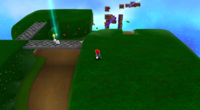
|
This mission's objective is to catch a Star Bunny. |
| The Dirty Tricks of Major Burrows | 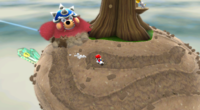
|
This mission's objective is to defeat Major Burrows. |
| Gusty Garden's Gravity Scramble | 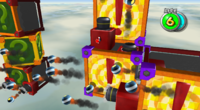
|
This mission's objective is to navigate a structure with fluctuating gravity. |
| Major Burrows's Daredevil Run | 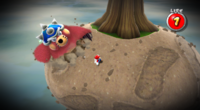
|
This mission's objective is to defeat Major Burrows while under the effects of the Daredevil Comet. |
| Purple Coins on the Puzzle Cube | 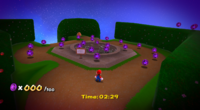
|
This mission's objective is to collect most of the Purple Coins on the Puzzle Cube planet within a time limit. |
| The Golden Chomp | 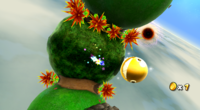
|
This mission's objective is to destroy a Gold Chomp. |
Gallery
Music
- Main article: Gusty Garden Galaxy (theme)
| File info 0:29 |
The background music for Gusty Garden Galaxy shares its name with the galaxy. The melody for "Gusty Garden Galaxy" is also reused in the game's themes "Purple Comet", "Birth", and the credits theme, "Super Mario Galaxy".
The theme has appeared in several later games and media in the Super Mario franchise, including the Mario & Sonic series, Super Mario Galaxy 2, Super Mario 3D World, Mario Kart 8 , the Super Smash Bros. series, and The Super Mario Bros. Movie.
Names in other languages
| Language | Name | Meaning | Notes |
|---|---|---|---|
| Japanese | ウィンドガーデンギャラクシー[?] Windo Gāden Gyarakushī |
Wind Garden Galaxy | |
| Chinese | 风之花园银河[?] Fēng zhī huāyuán yínhé |
Wind Garden Galaxy | |
| German | Windgarten-Galaxie[?] | Wind-Garden Galaxy | |
| Italian | Galassia Giardin Ventoso[?] | Windy Garden Galaxy | |
| Korean | 윈드 가든 갤럭시[?] Windeu gadeun gaelleoksi |
Wind Garden Galaxy | |
| Spanish (NOA) | Galaxia del Jardín Céfiro[?] | Zephyr Garden Galaxy | |
| Spanish (NOE) | Galaxia Jardín Céfiro[?] | Zephyr Garden Galaxy |
Trivia
- Gusty Garden Galaxy originally had Good Egg Galaxy's background as well as some similar planets.
- Various planets from this galaxy can be seen in the ending sequence when the camera zooms out.
